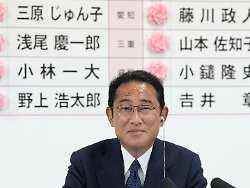election in Japan
LDP secures sole majority
7/11/2022 4:07 am
Despite a low turnout, the Liberal Democratic Party (LDP) again clearly won the upper house election in Japan. Even the murder of ex-Prime Minister Abe did not change that, it had already been expected before the assassination that the ruling coalition of Kishida would win.
Japan’s voters handed Prime Minister Fumio Kishida’s ruling Liberal Democratic Party (LDP) a landslide victory, ensuring political stability. The LDP secured a sole majority in the upper house election even without its coalition partner Komeito, as reported by the Japanese media after all votes were counted.
Accordingly, the party came two days after the assassination of former party and government leader Shinzo Abe to 63 of the 125 seats available for election. Although turnout at 52 percent was slightly higher than in the previous election, it is still one of the lowest to date. Even before the assassination, it had been expected that Kishida’s ruling coalition would win the election.
Kishida now has a solid power base to tackle his country’s daunting challenges. This includes Japan’s economic recovery, which is threatened by the corona pandemic due to rising energy and food prices. In addition, Russia’s invasion of Ukraine, China’s growing thirst for power and North Korea’s nuclear and missile programs have exacerbated the security situation. Structural problems such as the rapid aging of society due to low birth rates, the shortage of workers, rural exodus and the horrendous national debt remain unsolved.
The overwhelming electoral victory of the government camp is also likely to give further impetus to the debate about the change in the pacifist post-war constitution that the LDP has been aiming for for a long time. This had been the political life goal of the murdered Abe. The supporters’ camp secured the necessary two-thirds majority for this.
Widespread disenchantment with politics
In addition to the coalition parties, the opposition Democratic Party for the People and the conservative Nippon Ishin also support change. The latter was able to increase its number of seats, while the largest opposition party to date, the Constitutional Democratic Party, emerged from the election weakened. Many citizens do not see a real alternative to the LDP in the fragmented opposition, which is why some critics speak of a one-party state.
The LDP has governed with two brief interruptions since it was founded in 1955. According to experts, the LDP ultimately benefits from the widespread disenchantment with politics because it has a loyal core of voters. The strong influence of the LDP on the media also plays a role. For a long time, the heads of government in Japan had changed every year. That only changed under the murder of Abe, who ensured stability in Japan’s politics. But even he could not solve the pressing structural problems.
When he took office around nine months ago, his successor Kishida promised a “new capitalism” that would narrow the widening gap between rich and poor. In doing so, he distanced himself from the years of economic neoliberalism under Abe and undermined the opposition with his call for economic redistribution.
